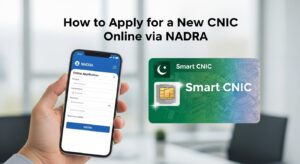The National Identity Card for Overseas Pakistanis (NICOP) is an essential document for Pakistanis living abroad. It allows you to travel to Pakistan without a visa, open bank accounts, buy property, and access various other services that require proof of Pakistani identity. For overseas Pakistanis, applying for or renewing your NICOP can seem like a daunting task, especially from a distance. However, with NADRA’s online “Pak-Identity” portal, the process has become significantly streamlined. This comprehensive guide will walk you through every step, ensuring a smooth application from anywhere in the world.
We’ll cover everything from preparing your documents to tracking your card’s delivery, anticipating common challenges and offering practical advice specific to the Pakistani context.
Understanding NICOP and Its Importance
Before diving into the application process, it’s crucial to understand what NICOP is and why it’s so vital for you as an overseas Pakistani.
What is NICOP?
NICOP stands for National Identity Card for Overseas Pakistanis. It’s a specialized identity card issued by the National Database and Registration Authority (NADRA) to Pakistani citizens who are residing abroad. This includes individuals who hold dual nationality.
Why is NICOP Important for You?
- Visa-Free Travel: If you hold dual nationality, a NICOP allows you to travel to Pakistan without needing a visa. This is a huge convenience, saving you time and money on visa applications.
- Proof of Identity: It serves as your primary proof of Pakistani nationality and identity while living abroad and when you visit Pakistan.
- Access to Services: Many services in Pakistan, such as opening bank accounts, purchasing property, vehicle registration, and applying for passports, require a valid NICOP.
- Legal Recognition: It ensures your legal recognition as a Pakistani citizen, which is vital for any official dealings or family matters within Pakistan.
Step 1: Preliminary Assessment and Category Selection
The first step is to figure out exactly what kind of NICOP application you need to submit. NADRA’s Pak-Identity system categorizes applications, and selecting the correct one is crucial to avoid delays.
- New Overseas ID Card: Select this if you’ve never had a NICOP before, or if you had a CNIC (Computerized National Identity Card) in Pakistan but are now residing abroad and need an overseas ID.
- Reprint ID Card: Choose this if your existing NICOP is lost, stolen, or damaged and you need a new one with the same details.
- Renew ID Card: This option is for when your NICOP is about to expire or has already expired.
- Modify ID Card: Use this if you need to update any information on your existing NICOP, such as your marital status, address, name (due to marriage, for instance), or any other personal details.
- Cancellation: This is for cancelling a NICOP, often due to renunciation of Pakistani nationality.
Take your time to understand your specific requirement. If you are unsure, look for the detailed FAQs or guidelines on the Pak-Identity portal itself.
Anticipating Challenges:
Sometimes, people confuse CNIC with NICOP. Remember, if you are an overseas Pakistani, even if you previously held a CNIC, you should apply for a NICOP when updating or getting a new ID. The NICOP allows you benefits like visa-free travel as a dual national.
Step 2: Preparing Your Documents and Essentials
This is arguably the most critical step. Having all your documents ready in the correct format before you start the online application will save you a lot of time and frustration.
General Requirements (Applicable to most categories):
Document / Requirement | Details / Instructions |
Previous Pakistani ID | Your existing CNIC or NICOP. Ensure it is not expired or severely damaged. |
Passport | Copy of your valid Pakistani passport; also your foreign passport if you hold dual nationality. |
Proof of Stay Abroad | Copy of residence permit, visa, foreign ID card, or other legal document proving your stay in the country of application. |
Photocopy of Parents’ CNIC/NICOP | Required for new applications or children. Ensure parents’ cards are valid. |
Spouse’s CNIC/NICOP | Required if married. Provide a copy of your spouse’s valid Pakistani ID. |
Marriage Certificate (Nikah Nama) | Needed for first-time married applicants or when updating marital status. Must be officially registered. |
Recent Photograph | Digital passport-sized photo following NADRA guidelines (white background, no shadows, clear face). Professional photo recommended. |
Fingerprint Form | Download from Pak-Identity portal, take fingerprints per tutorial, scan and upload. Essential for biometric verification. |
Attester / Witness Details | For overseas applicants: details of two valid NICOP-holding witnesses who are not spouse or immediate blood relatives. Include NICOP numbers, names, and contact info. They may be contacted for verification. |
Payment Method | Valid credit or debit card (Visa or MasterCard) enabled for international transactions for online fee payment. |
Specific Requirements (Depending on your application type):
Type of NICOP / Modification | Required Documents / Details |
New NICOP (Born in Pakistan) | Birth certificate issued by Union Council, Matriculation Certificate, or valid Pakistani Passport. |
New NICOP (Born Abroad – Children) | Child Registration Certificate (CRC) if available, detailed birth certificate showing both parents’ names, valid foreign passport of the child, and parents’ valid CNIC/NICOP. |
Lost/Stolen NICOP | Copy of police report detailing the loss or theft, if available. |
Modification – Change of Address | Latest utility bills, property papers in Pakistan, or an affidavit of address change. |
Modification – Name Change | Marriage certificate, divorce certificate, or relevant court order. |
Modification – Date of Birth Correction | Matriculation certificate, Pakistani passport, or birth registration certificate. |
Real-World Tips:
- Scanning Quality: Use a good quality scanner. Documents should be clear, legible, and scanned in grayscale at a minimum of 600 dpi as specified by NADRA. Blurry or low-resolution scans will be rejected.
- File Format: Most platforms prefer PDF or JPG. Ensure your file sizes are manageable.
- Organize Folders: Create a dedicated folder on your computer for all your NICOP documents. Label them clearly (e.g., “Passport_Scan.pdf”, “Father_NICOP.jpg”, “Photo.jpg”).
- Fingerprint Precision: The fingerprint capture is often tricky. Watch NADRA’s tutorial video carefully on their website. Use an ink pad and ensure all fingers are clearly imprinted in the designated boxes. Practice a few times on a separate paper before using the actual form.
Step 3: Creating Your Pak-Identity Account and Starting Application
Once your documents are ready, you can begin the online application process.
Step | Instructions |
Visit the Official Portal | Go to the NADRA Pak-Identity website. |
Register an Account | Click on “Register Account.” Provide your email, create a password, and verify your email if required. Choose a strong password and keep it safe. |
Log In | After registration and verification, log in to your new account. |
Start a New Application | Click on “New Application” or “Create an Application.” Select the appropriate category (e.g., “New Overseas ID Card,” “Renew ID Card”). |
Provide Delivery Address | Enter your full overseas address where the NICOP should be delivered, including postal code, accurately. |
Step 4: Filling Out the Application Form and Uploading Documents
This is where you’ll input all your personal details and upload the scanned documents.
Step | Instructions / Notes |
Personal Details | Fill in your name, father’s name, mother’s name, date and place of birth, gender, and nationality. Ensure they exactly match your documents. |
Family Details | Provide parents’ and spouse’s details (if applicable), including CNIC/NICOP numbers. |
Address Information | Enter your permanent address in Pakistan and your current overseas address. |
Upload Photograph | Upload a digital passport-sized photo. Use the system’s validator to confirm compliance with NADRA guidelines. |
Upload Supporting Documents | Upload all prepared documents systematically (e.g., old ID, proof of residence, marriage certificate, etc.) according to each section. |
Fingerprint Form Upload | Upload the scanned fingerprint form you prepared, ensuring clarity and proper placement. |
Attester Details | Enter details of two non-blood-relative NICOP-holder witnesses (NICOP number, name, contact). |
Review and Declaration | Carefully check all information for typos or errors. Tick the declaration box to confirm accuracy. |
Common Mistakes to Avoid:
- Typos: Even a single incorrect letter in your name or father’s name can cause problems. Double-check everything.
- Incorrect Dates: Verify your date of birth and other dates.
- Low-Quality Scans: As mentioned, this is a major one. Ensure clarity and correct resolution.
- Missing Documents: Don’t skip any required uploads. If a document is genuinely not applicable, check if there’s an option to state that or contact NADRA support for guidance.
- Fingerprint Issues: Make sure your fingerprints are clear and within the designated boxes. Smudged or incomplete prints are a common reason for rejection.
- Attester Validity: Ensure your chosen witnesses have valid NICOPs and are contactable for verification.
Step 5: Payment of Fees
After filling out the form and uploading documents, you’ll proceed to the payment section.
- Select Fee Type: NADRA offers different processing speeds:
- Normal: Longest processing time, lowest fee.
- Urgent: Faster processing time, moderate fee.
- Executive: Fastest processing time, highest fee.
Choose the option that best suits your needs and budget.
- Enter Card Details: Provide your credit or debit card details (card number, expiry date, CVV) in the secure payment gateway.
- Confirm Payment: Review the amount and confirm the payment. You will usually receive a transaction ID or confirmation.
Anticipating Challenges:
- International Transactions: Ensure your bank has enabled international transactions on your card. Some banks might block payments if they detect unusual activity, so it’s wise to inform your bank beforehand if you plan a large international payment.
- Currency Conversion: The fee will be charged in your local currency at the prevailing exchange rate. Be aware of potential conversion fees from your bank.
- Failed Payments: If a payment fails, double-check your card details, internet connection, and try again. If it persists, contact your bank or NADRA support.
Step 6: Submission and Application Tracking
Once the payment is successful, your application will be officially submitted. The next step is to keep an eye on its progress.
Step | Instructions / Notes |
Confirm Submission | After paying the fee, note your application tracking ID. It will also be available in your Pak-Identity account. |
Log In to Track | Access your Pak-Identity account on the NADRA website. |
Check Status | Go to “Track Application” or “My Applications” and enter your tracking ID. |
Understand Status Updates | Common statuses:
|
Respond to Deferrals | If deferred, upload additional documents or correct issues as instructed online. Prompt action avoids further delays. |
Estimated Processing & Delivery Times |
Times may vary due to volume or verification requirements. |
Anticipating Challenges |
|
Step 7: Receiving Your NICOP
The final and most awaited step is receiving your new NICOP at your doorstep.
- The courier company (often DHL for international deliveries) will deliver your card to the present address you provided during the application.
- Ensure someone is available at the address to receive the delivery and sign for it.
- Once you receive the card, inspect it carefully for any errors in printing (e.g., name, date of birth, photo). If you find any, immediately contact NADRA’s helpline.
Important Considerations and Tips for Overseas Pakistanis
- Maintain Your Records: Keep a digital and physical copy of your application tracking ID, payment receipt, and all submitted documents. This will be invaluable if you need to follow up or reapply.
- NADRA’s Customer Support: NADRA has a dedicated customer support system. If you encounter any issues during the online application, refer to their FAQs or use their online complaint management system. You can also call their helpline from abroad (international charges apply).
- Consular Services vs. Online Application: While some Pakistani consulates abroad might offer limited NADRA services, the Pak-Identity online portal is the primary and most efficient method for most NICOP applications from overseas. If you apply online, direct all your queries to NADRA Headquarters in Pakistan, not the embassy/consulate, as they usually cannot intervene in online application processes.
- Keeping Your Information Updated: It is crucial to keep your NICOP information updated. If your marital status changes, you move to a new address, or your name changes, apply for a modification promptly. This ensures your official records are accurate and prevents future complications.
- Children’s NICOPs: Children born to Pakistani parents abroad are eligible for NICOP. The process is largely similar, but requires parents’ NICOPs and the child’s birth certificate and foreign passport. For minors, usually one parent’s presence and biometric verification are required at the consulate, but for online applications, clear documentation and fingerprint forms are key.
Resources
- NADRA Pak-Identity Official Website
- NADRA’s Online Complaint Management System (Accessible via NADRA’s main website)
- NADRA Helpline (International contact numbers usually listed on their website, e.g., +92-51-111786700)
- Courier Service (e.g., DHL) for tracking dispatched cards





